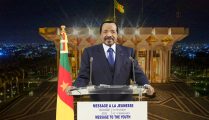29, December 2016
Boko Haram militants surrender in Niger 0
Dozens of militants with the Takfiri Boko Haram terrorist group have surrendered to Nigerien authorities, less than a week after Nigeria announced that its troops captured the group’s last key bastion in the country’s northeast.
“Thirty one young people from Diffa, who were enrolled a few years ago in Boko Haram, decided to surrender,” Nigerien Interior Minister Bazoum Mohamed said. The troubled Diffa region, located in the southeasternmost part of Niger, borders Nigeria’s volatile Borno State, where Boko Haram hides in the dense Sambisa Forest.
One of the deserters appeared on a Nigerien public television program and recounted why they had decided to give themselves up to local authorities. “We have deserted Boko Haram because we found that what the organization stands for is not acceptable. We expect a pardon from the government so that we can participate in the development of the country and help us get rid of the trauma,” he said.
The Nigerien government has reportedly assured that it will grant an amnesty for all the deserters providing that they undergo a de-radicalization program, after which they will be enrolled in socio-economic reintegration projects.
Back in June, tens of thousands of people were forced to abandon their homes in Diffa as Boko Haram terrorists launched a sweeping offensive across the region, and in September, at least five Nigerien troopers were killed by the terror group near the village of Toumour, about 65 kilometers northeast of Diffa.
Niger has been one of the countries affected by the more than seven years of Boko Haram militancy in Nigeria. The Takfiri terrorist group has routinely launched attacks across Nigerian borders into Niger, Chad and Cameroon.
Presstv


























30, December 2016
US: Obama under pressure to prove Russian hacking 0
The outgoing administration of US President Barack Obama is under extreme pressure to release evidence confirming allegations of cyber attacks by Russia to influence the presidential election before leaving office.
The Obama administration has only provided little documentation to support its official assessment in October that Moscow was attempting to interfere in the 2016 presidential election. The White House has also failed to confirm subsequent leaks from anonymous officials contending that the CIA believes Moscow’s interference was an attempt by Russian President Vladimir Putin to help President-elect Donald Trump defeat Hillary Clinton.
Obama has ordered the intelligence community to conduct a full review of alleged hacking by the Russians before he leaves office on January 20. The White House has said it will make as much of the report public as it can. But officials have warned that the document will contain “highly sensitive and classified information” and it is unclear how much evidence it will be able to release.
Trump has rejected assertions that the Russian government was involved in the hacks on the Democratic National Committee (DNC) and Clinton campaign chairman John Podesta. Julian Assange, the founder of WikiLeaks, which published the stolen emails, has denied that the Russian government provided the files. The US claim has also been rejected by Moscow.
On Thursday, Obama ordered a series of economic sanctions against Russia, as well as expulsion of 35 Russian diplomats over hacking allegations. “I have ordered a number of actions in response to the Russian government’s aggressive harassment of US officials and cyber operations aimed at the US election,” Obama said in a statement.
According to statements from the White House and the Treasury Department, the sanctions target Russia’s FSB and GRU intelligence agencies, four individual GRU officers, and three companies who allegedly provided support to the GRU, and two Russian individuals for using cyberattacks to cause misappropriation of funds and personal identifying information.
Presstv